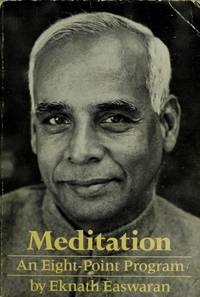 First edition | |
| Author | Eknath Easwaran |
|---|---|
| Language | English (orig.) & trans.: Bulgarian,[1] Chinese,[2] Czech,[3] Dutch,[4] French,[5] German,[6][7][8] Hungarian,[9] Korean,[10] Lithuanian,[11] Portuguese,[12] Romanian,[13] Russian,[14] Slovenian,[15] Spanish,[16][17] Telugu[18] |
| Publisher | Nilgiri Press; others |
Publication date | 1978 (original); 2016; others |
| Pages | 237 (1978); 270 (2016) |
| ISBN | 978-1-58638-116-5 |
| OCLC | 950007677. |
Passage Meditation is a book by Eknath Easwaran, originally published in 1978 with the title Meditation. The book describes a meditation program, also now commonly referred to as Passage Meditation. Easwaran developed this method of meditation in the 1960s, and first taught it systematically at the University of California, Berkeley.[19][20]
The program is an eight-point program intended for the "spiritual growth" of the practitioner. The first step in the program involves meditating on a text passage, and since the 1990s the method as a whole has come to be known as "Passage Meditation" (not Easwaran's term). The book has been frequently reprinted and translated into 14 languages. It is reported that more than 200,000 copies were sold in the period of 1978 to 2001.
The first edition of the book had the full title Meditation; commonsense directions for an uncommon life (1978). A second edition in 1991 was subtitled a simple eight-point program for translating spiritual ideals into daily life, and a third, revised edition of the book was published posthumously as Passage Meditation; Bringing the Deep Wisdom of the Heart Into Daily Life (2008).
A fourth, revised edition was published as Passage Meditation – A Complete Spiritual Practice: Train Your Mind and Find a Life that Fulfills (2016). The fourth edition included a new part, not contained in earlier editions, with approximately 80 pages of "Questions and Answers" to numerous questions about meditation (pp. 182–264).
- ^ Cite error: The named reference
bulgarian03was invoked but never defined (see the help page). - ^ Cite error: The named reference
chinese10was invoked but never defined (see the help page). - ^ Cite error: The named reference
Czech04was invoked but never defined (see the help page). - ^ Cite error: The named reference
dutch93was invoked but never defined (see the help page). - ^ Cite error: The named reference
french96was invoked but never defined (see the help page). - ^ Cite error: The named reference
german91was invoked but never defined (see the help page). - ^ Cite error: The named reference
german98was invoked but never defined (see the help page). - ^ Cite error: The named reference
german09was invoked but never defined (see the help page). - ^ Cite error: The named reference
hungarian99was invoked but never defined (see the help page). - ^ Cite error: The named reference
korean03was invoked but never defined (see the help page). - ^ Cite error: The named reference
lithuanian99was invoked but never defined (see the help page). - ^ Cite error: The named reference
portuguese19was invoked but never defined (see the help page). - ^ Cite error: The named reference
romanian08was invoked but never defined (see the help page). - ^ Cite error: The named reference
russian91was invoked but never defined (see the help page). - ^ Cite error: The named reference
slovenian99was invoked but never defined (see the help page). - ^ Cite error: The named reference
spanish95was invoked but never defined (see the help page). - ^ Cite error: The named reference
spanish99was invoked but never defined (see the help page). - ^ Cite error: The named reference
telugu98was invoked but never defined (see the help page). - ^ Tim Flinders & Carol Flinders (1989). The making of a teacher: Conversations with Eknath Easwaran (see article). Petaluma, CA: Nilgiri Press. ISBN 978-0-915132-54-6 (p. 148: "On the evening of Monday, January 3, 1968, 2000 LSB had standing room only for the several hundred Berkeley students who had registered for The Theory and Practice of Meditation (Religious Studies 138X, four units' credit; instructor, Eknath Easwaran). To anyone's knowledge, it was the first accredited course on meditation offered by any university in the United States - or, for that matter, in the world. ... For ten Monday nights, Easwaran sat atop the black veneer of the demonstration table and lectured on the ancient mystical teachings of the Indian spiritual tradition. Required texts included Patanjali's Yoga Sutras, the Upanishads, the Bhagavad Gita, and Sidney Spencer's Mysticism in World Religion.")(quote viewable online)
- ^ Yoga Journal: Yoga Luminaries http://www.yogajournal.com/wisdom/1192